DigitalOcean’s 2025 Currents research report found that 79% of organizations are already integrating AI, a sharp rise from 49% just a year earlier. While adoption is growing, many teams and individuals are still searching for structured ways to build practical skills—32% remain in exploration mode and 66% of developers experiment with AI through passion projects.
For those ready to move beyond experimentation, the question becomes: what’s the fastest path to production-ready skills? AI/ML bootcamps are an option that offers focused, hands-on learning pathways that match the speed of industry change. Whether you’re a working professional, a student, or a career changer, these immersive bootcamps provide the skills, projects, and mentorship needed to move from curiosity to career skills. In this article, we explore 10 AI/ML bootcamps designed to support your first steps or next leap into AI/ML.
💡Key takeaways:
-
AI/ML bootcamps condense months of self-study into guided, intensive programs that balance theory with practical projects, helping learners make a focussed progress.
-
The curriculum is structured to offer immersive, project-driven courses curated for different audiences like working professionals looking to upskill, students seeking industry exposure, and career changers entering AI.
-
From open-source, self-paced formats to university-backed programs, and industry-aligned platforms, bootcamps offer a variety of structures, mentorship options, and career support to match individual goals.
-
AI/ML bootcamps like Codebasics, TalentSprint, Caltech, Udemy, LunarTech, Sprints, and Curiousily offer structured courses to build hands-on, industry-aligned AI/ML skills.
What is an AI/ML bootcamp?
An AI/ML bootcamp is an intensive, short-term training program designed to equip learners with practical skills in AI/ML. Bootcamps focus on hands-on projects, real-world applications, and industry-relevant tools, which makes them useful for beginners to explore AI/ML concepts, professionals looking to transition into AI/ML roles or upskill within their current careers.
These programs cover topics such as data preprocessing, supervised and unsupervised learning, deep learning, natural language processing (NLP), LLM, computer vision, and model deployment. Many bootcamps also include exposure to popular frameworks like TensorFlow, PyTorch, scikit-learn, integrated with cloud-based platforms for model training and deployment. Some bootcamps also provide access to AI/ML communities where participants can collaborate, share knowledge, and connect with peers and mentors, so that they stay engaged and supported throughout their learning journey.
-
Choosing between PyTorch and TensorFlow? Explore the key differences and strengths and which deep learning framework is better for you!
-
Learn how to use data/model parallelism and avoid out-of-memory errors in PyTorch. Optimize PyTorch with multi-GPU memory management.
How to choose an AI/ML bootcamp?
Choosing the right AI/ML bootcamp depends on your career goals, learning style, and the depth of technical knowledge you want to gain. While most programs promise hands-on experience, it’s important to evaluate them against your needs.
1. Curriculum
Look for a bootcamp that offers a comprehensive curriculum, covering both foundational and advanced topics. A strong program should include machine learning fundamentals, deep learning, NLP, computer vision, and model deployment. Check whether the bootcamp balances theory with practical projects so you can apply concepts in real-world scenarios. For instance, review the course syllabus to confirm there’s a capstone project where you’ll build something substantial—like a recommendation engine for e-commerce, a computer vision system for medical imaging, or a chatbot with sentiment analysis capabilities
-
Confused between machine learning and NLP? Discover how machine learning powers decision-making while natural language processing helps machines understand and communicate with humans.
-
Explore the nuances between NLP and NLU. Read this article to understand how they differ and work together to make AI conversations more human-like.
2. Mentorship
Programs led by experienced practitioners, researchers, or industry experts provide deeper insights into real-world applications. Mentorship opportunities might help you better in grasping complex topics and receiving career guidance. If attending in-person, verify there’s face-to-face feedback sessions, mentor-led study groups, and opportunities to shadow instructors during their industry work. For online bootcamps, ensure there’s regular mentor check-ins via video, asynchronous code reviews with detailed comments, and access to mentors through multiple channels like Slack DMs or scheduled calls.
3. Career support
Many bootcamps offer career services such as resume reviews, interview preparation, and networking opportunities. Some even partner with tech companies to provide direct job placement assistance. If your goal is to transition into an AI/ML role, prioritize programs that highlight their alumni success and hiring partners.
4. Learning format
Bootcamps can be delivered in online, hybrid, or in-person formats, with schedules ranging from full-time immersive programs to part-time options for working professionals. Choose a format that fits your timezone, lifestyle and so that you can complete the program without burning out.
5. Cost
AI/ML bootcamps vary in cost. Consider whether the program offers scholarships, financing options, or income-share agreements (ISAs). Weigh the cost against potential career outcomes, higher salaries, new opportunities, or entry into specialized AI/ML roles.
💡Whether you’re a beginner or a seasoned expert, our AI/ML articles help you learn, refine your knowledge, and stay ahead in the field.
10 intensive AI/ML bootcamps in 2025
AI and ML bootcamps have immersive, career-focused programs that combine technical training with projects and mentorship. Several bootcamps stand out for offering comprehensive curricula, practical experience, and a pathway to high-demand AI/ML roles.
1. Codebasics
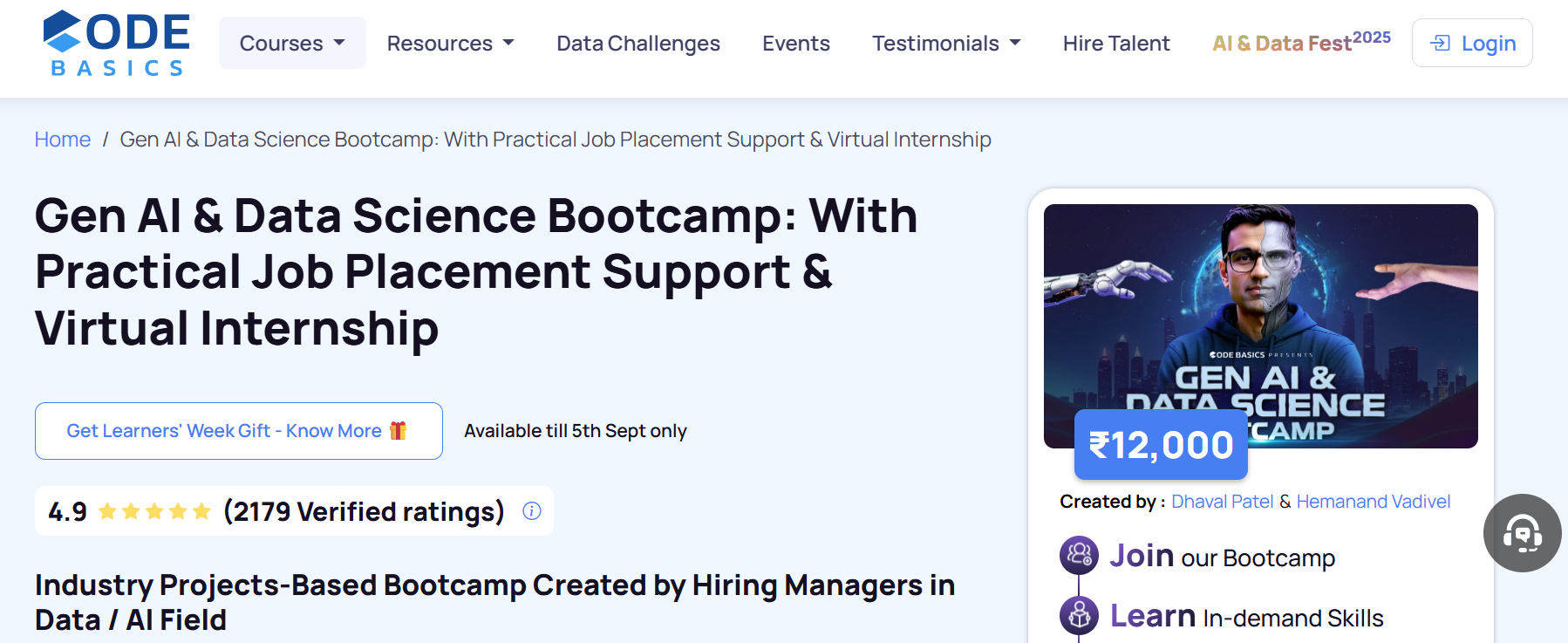
The Codebasics “Gen AI & Data Science Bootcamp” is a structured, project-focused program designed to prepare learners for AI, ML, and data-driven careers. Led by instructors with industry recruiting experience, the bootcamp integrates 12+ real-world projects, two virtual internships, and ongoing job placement assistance. It offers lifetime access to course materials, for learners to revisit content skills over time.
Bootcamp highlights:
-
Graduates gain competencies aimed at roles like Data Scientist, Machine Learning Engineer, NLP Engineer, or AI Engineer.
-
Created by individuals with direct hiring experience in the data industry, aligning curriculum with recruitment needs.
-
Helps learners build their portfolio website for free.
2. Fullstack Academy
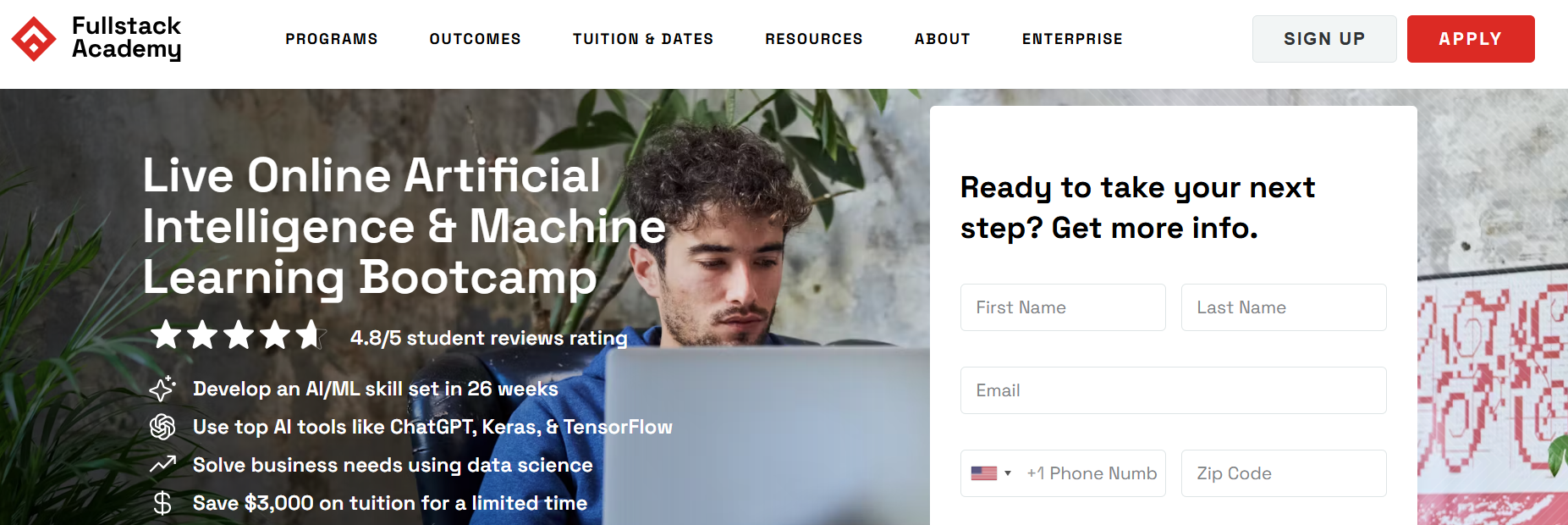
The Fullstack Academy AI/ML bootcamp is a live, online, part‑time program that is scheduled for 26 weeks. It prepares individuals with some programming and mathematical background for roles in AI, machine learning, and related data fields. Throughout the program, participants engage in real-world scenario‑based projects and graduate with a portfolio that showcases their ability to apply AI techniques to practical problems.
Bootcamp highlights:
-
Classes are held Mondays, Wednesdays, and Thursdays from 8:00 pm to 11:00 pm ET.
-
Begins with a programming and Python refresher, applied data science, machine learning, deep learning, NLP, and generative AI, culminating in hands-on capstone projects like autonomous driving object detection or recommendation systems.
-
Access up to one year of 1:1 career coaching, tools for resume and LinkedIn optimization, interview prep, networking tactics, and salary negotiation skill-building.
3. TalentSprint
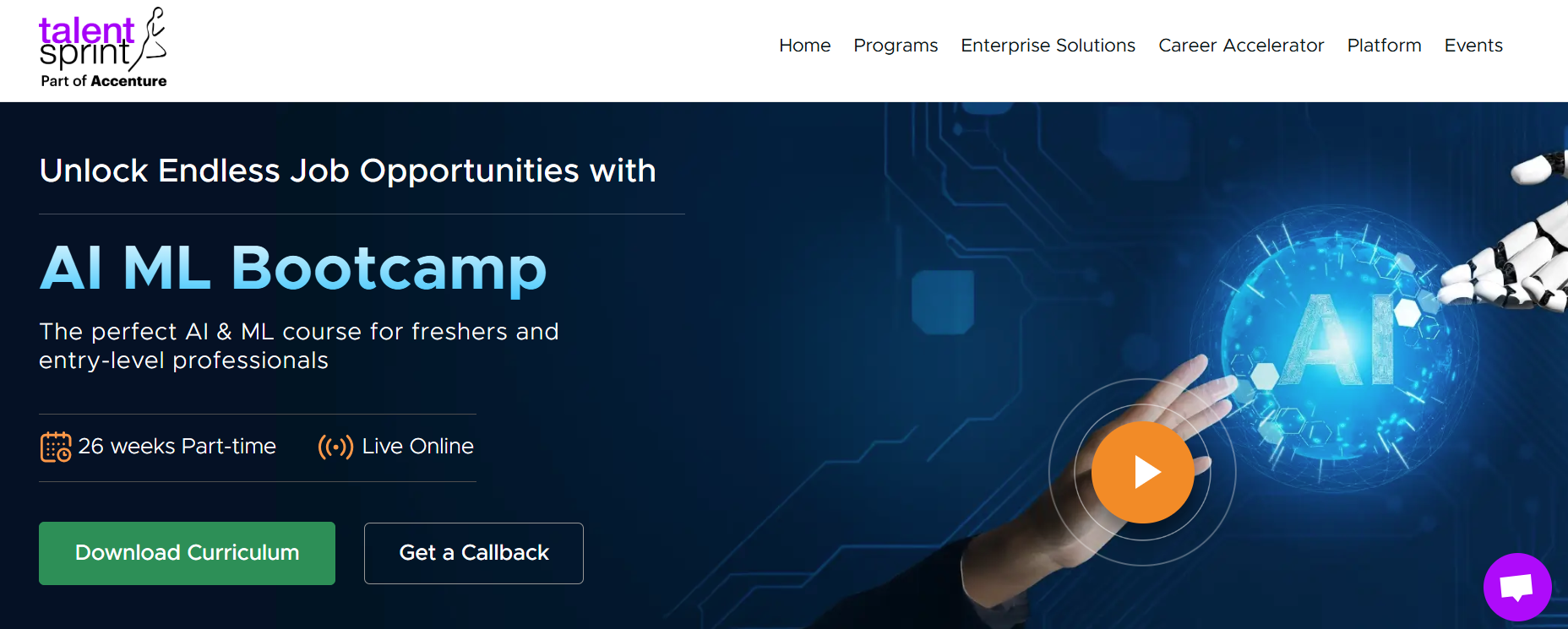
TalentSprint, a part of Accenture, is a 26-week, part‑time, live‑online program for freshers and entry-level professionals to build foundational AI and machine learning skills. The curriculum has interactive weekend classes, real-world projects, and practical tool usage. You’ll develop skills in Python programming, data exploration, problem formulation and solving, AI/ML algorithms, and deep learning practices, applying these through capstone projects.
Bootcamp highlights:
-
Uses a network of 700+ recruitment partners, hosts weekly drives, and runs quarterly job fairs to connect learners directly with hiring opportunities.
-
Participants receive one-on-one mentoring, mock interviews, and interview preparation sessions.
-
Delivers technical training that includes 8+ tools and real-life project applications, ensuring learners gain applicable, practical skills.
4. Caltech
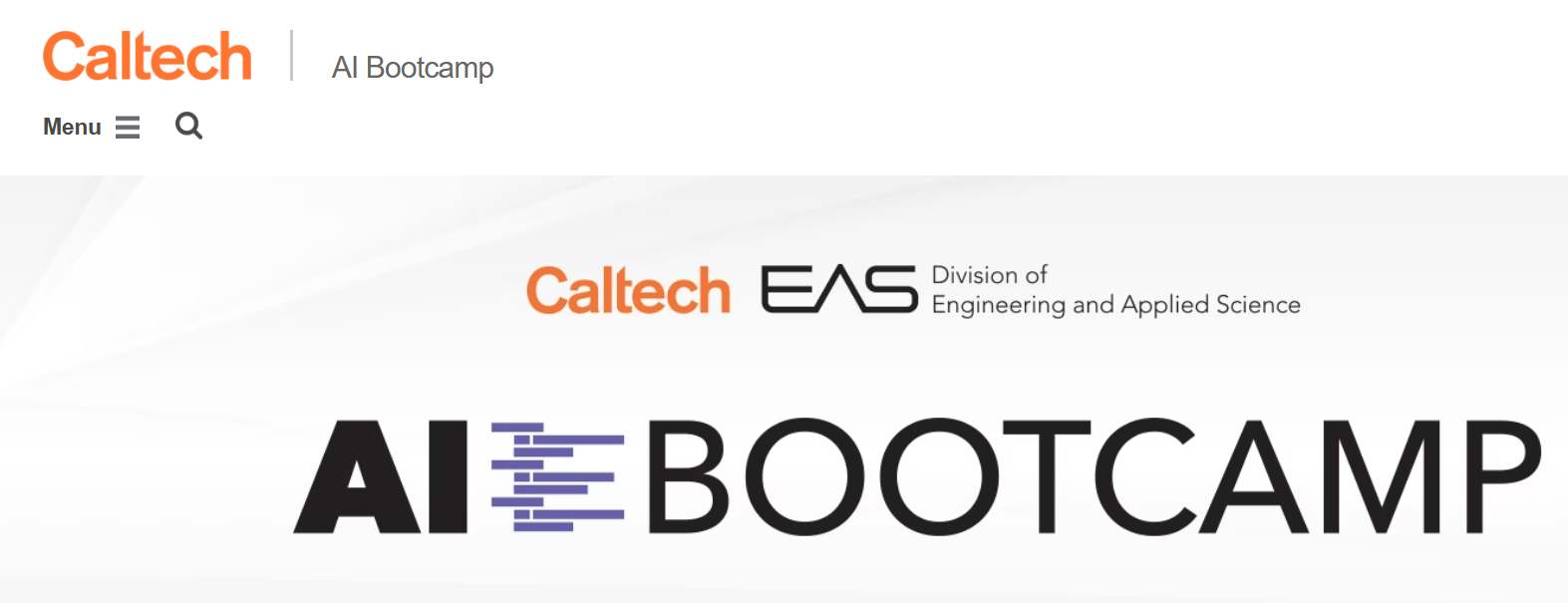
The Caltech AI bootcamp is a one-week training series by the division of Engineering and Applied Sciences of the California Institute of Technology. The course is scheduled from Monday through Friday, 9 a.m. to 5 p.m., held around 8 to 10 sessions annually. It is focused on introducing ML tools and concepts relevant to Ai/ML research. Its intent is to equip participants with the ability to know when and how to effectively use AI in their scientific work, and offers a focused learning experience for academic researchers.
Bootcamp highlights:
-
Applicants are required to be graduate students or postdoctoral researchers with prior knowledge of Python and the mathematical foundations of AI (linear algebra, calculus, and probability). They are also expected to bring relevant research problems that could benefit from AI, as the bootcamp emphasizes mapping research into frameworks where machine learning can be effectively applied.
-
Aims to help researchers understand the appropriate contexts, and limitations of AI and ML within their own academic and research workflows.
-
The curriculum is structured around both lectures and practical, hands-on sessions, learning through direct application, so that the participants learn theory, and apply ML and AI concepts in workflows.
5. Udemy
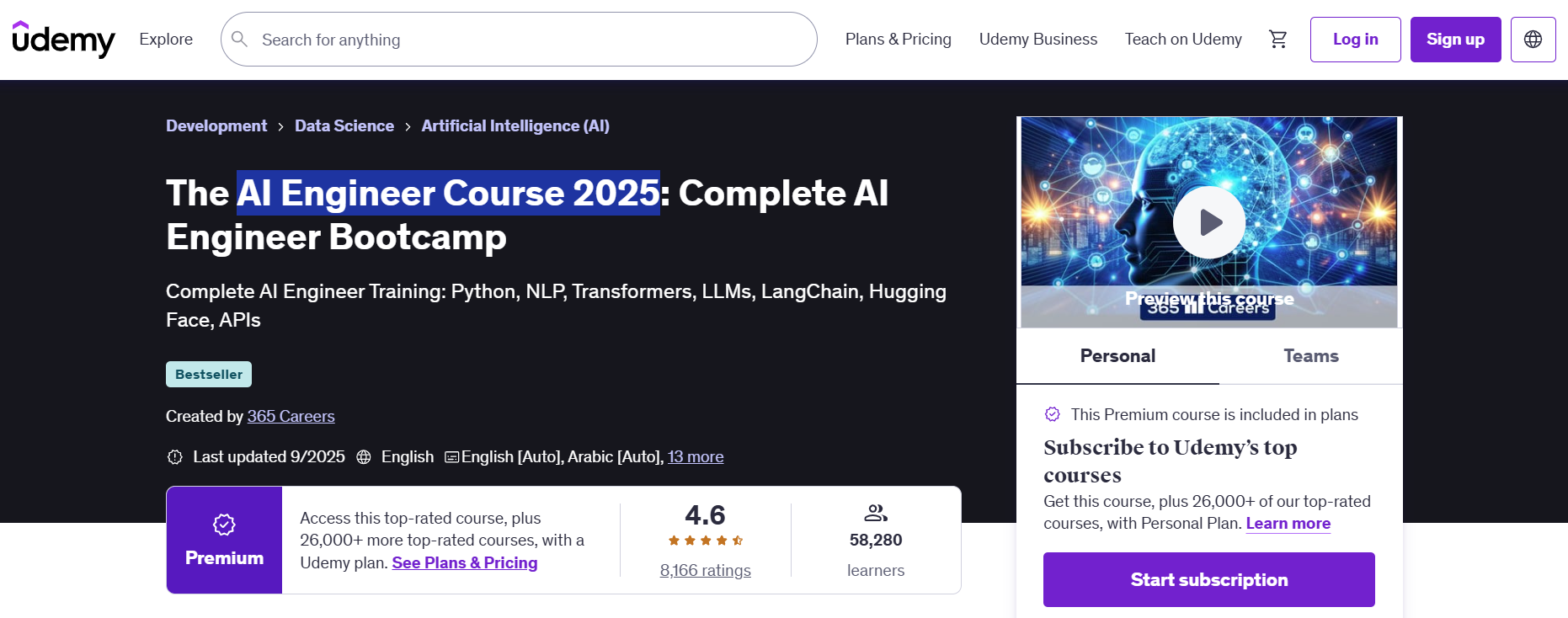
The Udemy AI engineer bootcamp is curated to guide beginners through the concepts and tools of AI engineering. It starts with foundational AI principles and Python programming, then progresses into working with LLMs, NLP, LangChain, vector databases like Pinecone, APIs, Transformers, and Hugging Face. The course spans over 28.5 hours across 433 lectures.
Bootcamp highlights:
-
Includes practical exercises, helping learners apply AI concepts in contexts like application integration and problem-solving.
-
Teaches the usage of APIs and connects to powerful foundation models.
-
Hosts detailed sessions on LangChain for AI workflow orchestration, vector databases, and model hosting through APIs and Hugging Face.
-
Set up Hugging Face’s Llama 3.1 on DigitalOcean GPU Droplets easily! This guide covers everything from setup to exploring Transformers, Pipelines, and Tokenizers, helping you launch AI models with ease!
-
Productivity tools help simplify deployment, orchestration, and model management. Watch how LangChain integrates with DigitalOcean Gradient to simplify fine-tuning and inferencing workflows ⬇️
6. Lunartech
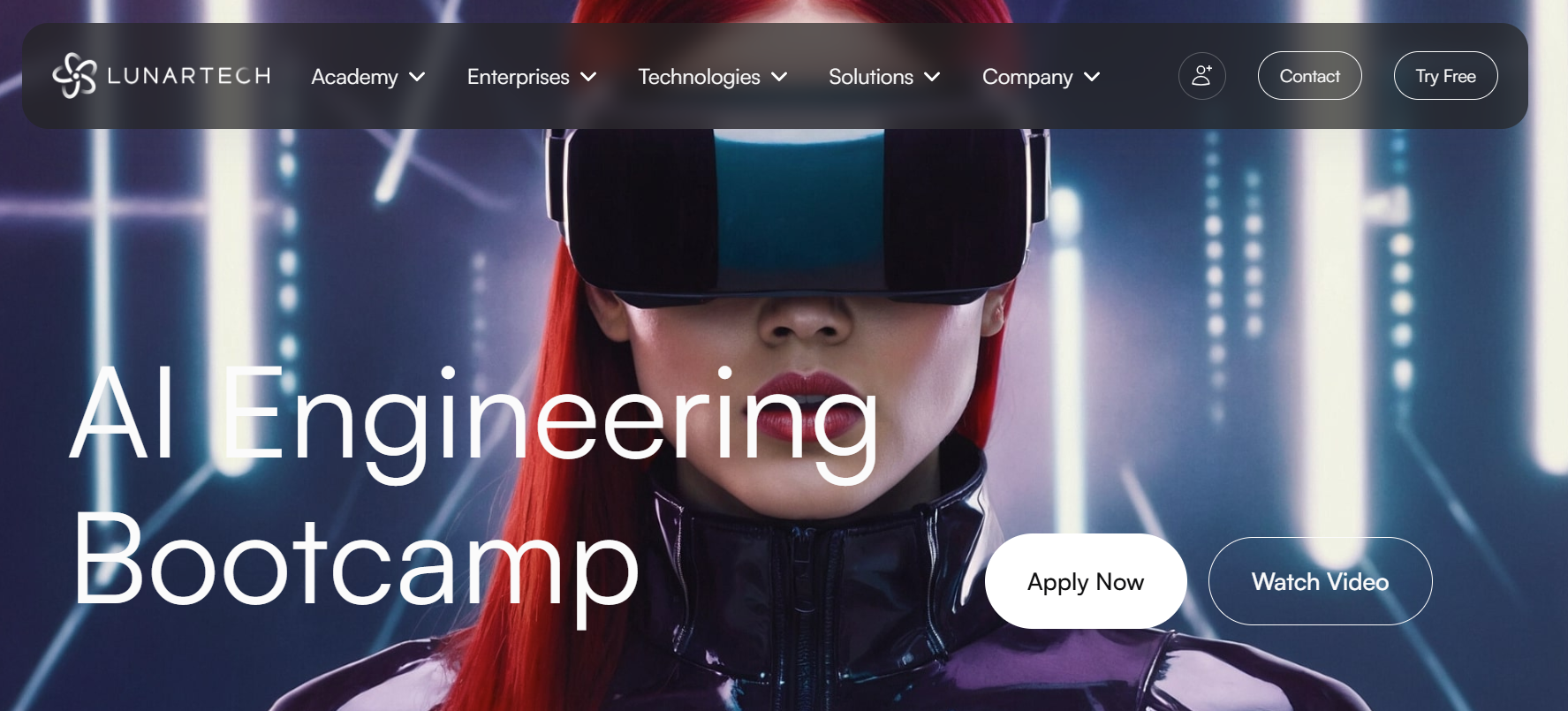
The LunarTech AI Engineering bootcamp is an advanced, self-paced training program on building deep expertise in Gen AI across the full model lifecycle, from foundational mathematics and statistical grounding to hands-on development of AI/ML projects. With over 400 learning hours, it covers aspects in building real-world applications through industry-aligned case studies, model fine-tuning, deployment strategies, optimization techniques, and AI ethics.
Bootcamp highlights:
-
Includes 10+ real-world projects and case studies that simulate the kinds of challenges faced by startups and Fortune‑level organizations which helps participants build a rich, practical portfolio.
-
Learners benefit from 24/7 access to more than 200 AI‑powered study assistants that offer guidance and personalized help to simplify complex concepts.
-
Modules cover Gen AI architectures like GANs, VAEs, Transformers, LLMs, and present practical aspects such as model optimization, deployment, AI ethics and compliance, and RAG.
💡Wondering what sets Gen AI apart from traditional AI? While traditional AI focuses on reasoning and decision-making, Gen AI is trained to create content like text, images, and music.
7. Big Blue Data Academy
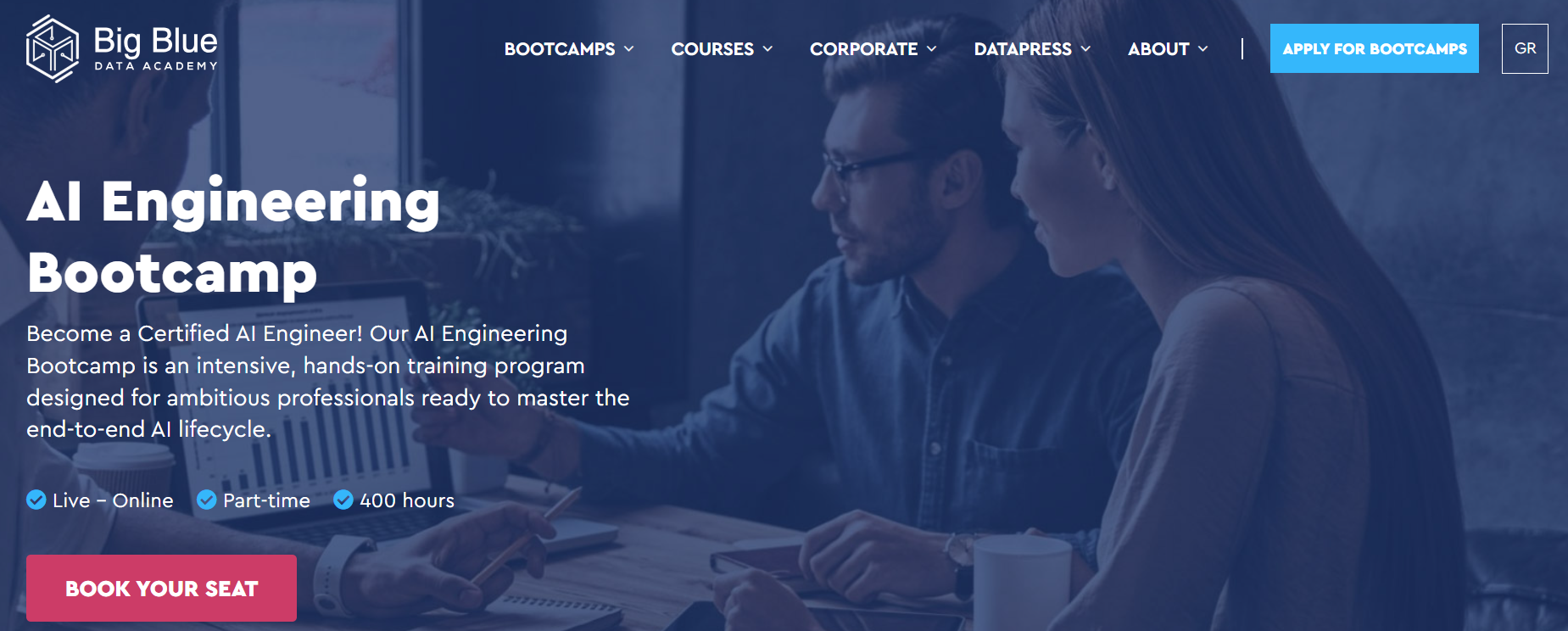
The AI engineering bootcamp at Big Blue Data Academy is a part-time, live-online training program for approximately 400 hours (around 20 weeks), aimed at professionals seeking mastery across the end-to-end AI lifecycle. Led by industry experts, the curriculum covers data ingestion, advanced Python programming, ML fundamentals, deep learning with PyTorch, AI agent construction, and deployment through containerization and cloud platforms, culminating in a GitHub-maintained portfolio highlighting real-world AI solutions.
Bootcamp highlights:
-
Follows an active learning model, around 25% dedicated to theory and lectures, and 75% focused on practical exercises and live coding.
-
Students receive career services, like CV and LinkedIn workshops, mock interviews, and ongoing support after graduation, and access to the academy’s hiring network.
-
Graduates join an ongoing community network, which provides continued professional connection and support, even beyond course completion.
8. Springboard

The Springboard bootcamp, delivered online over approximately nine months, is designed to take learners from foundational concepts in machine learning and deep learning through to designing, prototyping, and deploying full ML systems, accessible via API or web service. Created in partnership with the University of Arizona’s Continuing and Professional Education, the program includes real-world relevance through hands-on projects, mentorship with working industry professionals, and personalized career coaching.
Bootcamp highlights:
-
Upon completion, students earn a certificate issued in collaboration with the University of Arizona.
-
Includes AI ethics and bias, deep learning, large language models, anomaly detection, and the software stack necessary for deploying ML systems at scale using tools like AWS and Docker.
-
Provides 1-on-1 mentorship with working industry experts, and dedicated career coaching to assist with job search strategy, resume development, and interview readiness.
9. Sprints
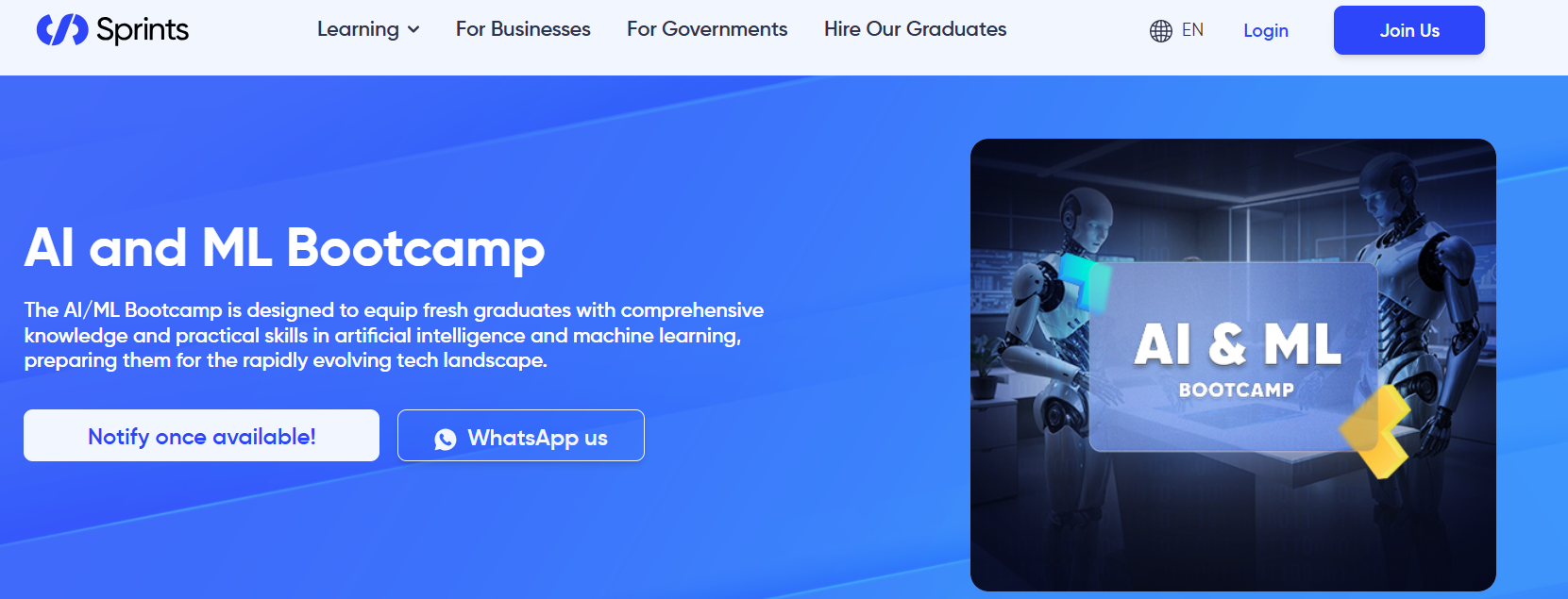
The Sprints AI & ML bootcamp is a live program designed to prepare fresh graduates for careers in artificial intelligence and machine learning. Delivered over approximately 12 weeks, it includes around 290 learning hours, 60+ tasks, and 5+ projects. The curriculum covers AI foundations such as Python programming, data pipelines, machine learning, deep learning, NLP, generative AI techniques, and soft skills like career boosting, and project management, interpersonal skills. The bootcamp targets learners in the Middle East and Africa and is delivered primarily in Arabic with English artifacts.
Bootcamp highlights:
-
Features 20+ interactive live sessions across its duration, offering real-time instruction and learner engagement.
-
Includes modules on career readiness, project management (Agile), and interpersonal communication, building soft skills alongside technical depth.
-
With 60+ tasks and over 5 projects, the program emphasizes structured, applied learning, allowing participants to practice and showcase real-world AI/ML problem-solving.
10. Curiousily
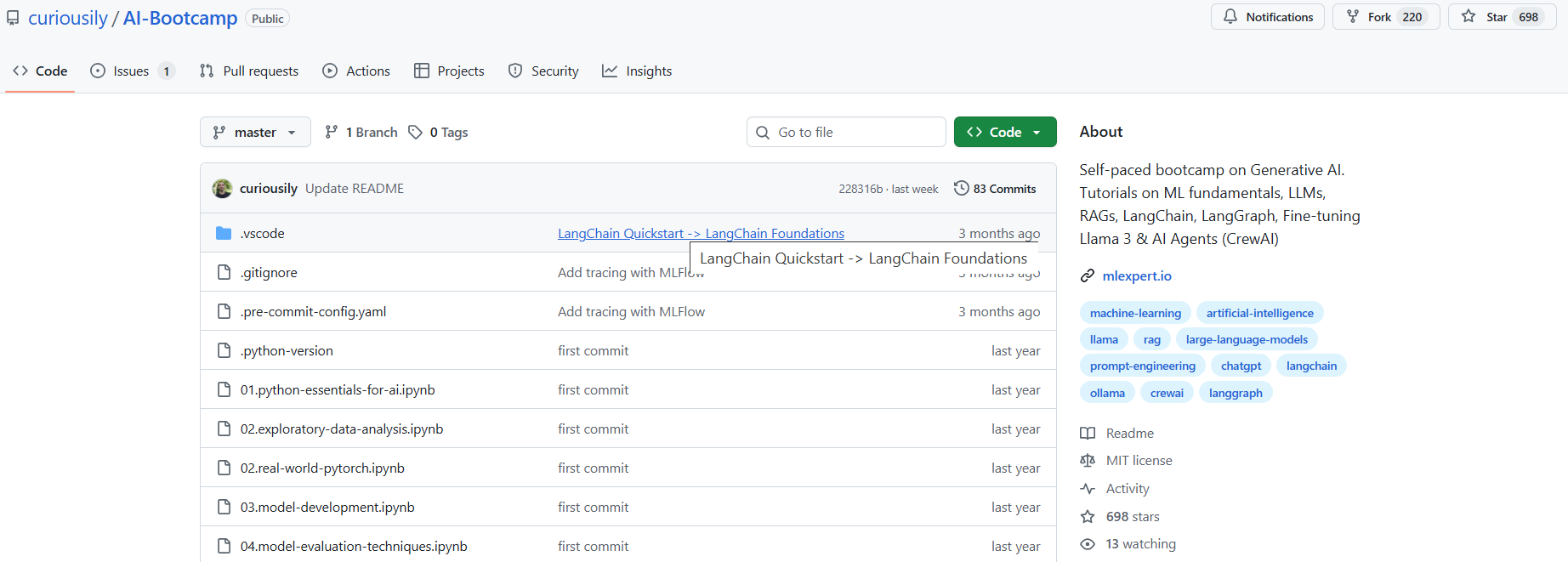
The Curiousily AI Bootcamp, nicknamed “Get Shit Done with AI”, is an open-source, self-paced program hosted on GitHub by Venelin Valkov, a full-time Machine Learning engineer. The bootcamp focuses on Generative AI and modern ML engineering practices. Delivered through Jupyter Notebook based tutorials, it covers a wide spectrum of topics including ML fundamentals, LLMs, RAG, LangChain, LangGraph, fine-tuning LLaMA 3, and building AI agents with CrewAI.
Bootcamp highlights:
-
Content flows across the entire AI engineering workflow, from Python and math foundations, through building ML pipelines, and deploying AI models.
-
Each module is presented as executable Jupyter notebooks where learners can directly work through code examples and experiment in real time.
-
The repository links learners to a broader learning ecosystem, via a community Discord, and a YouTube channel.
Note: The information in this article is correct as of September 4, 2025, and is subject to change. Bootcamp structures, and offerings may evolve over time. We recommend visiting each bootcamp’s official website or forum for the most up-to-date details.
References
AI and Machine Learning Bootcamp FAQs
How much do AI/ML bootcamps cost?
Most AI/ML bootcamps range between $5,000 to $20,000, depending on duration, delivery format, and the depth of the curriculum. Shorter online basic level programs tend to be on the lower end, less than $5000. In-person, full-time immersive programs are usually more expensive.
Are AI bootcamps worth it for career changers?
For career changers, AI bootcamps can be valuable because they provide a structured, intensive learning path that focuses on practical skills and real-world applications. However, the payoff depends on the individual’s background: those with prior programming or math experience may see faster results, while complete beginners may need additional time and practice beyond the bootcamp.
How long does it take to complete an AI bootcamp?
Most AI/ML bootcamps last 3 to 9 months, depending on whether they’re full-time or part-time. Full-time programs are mostly 10–12 weeks long, while part-time formats extend to 3–9 months to accommodate working professionals.
What skills do you need before joining an AI bootcamp?
A baseline understanding of Python programming, statistics, and linear algebra is recommended. Familiarity with tools like NumPy, pandas, or scikit-learn can help. Many bootcamps provide preparatory material (“pre-work”) to bring students up to speed before diving into advanced topics like deep learning or NLP.
Are online AI bootcamps as effective as in-person ones?
Yes, if structured well, online bootcamps can be just as effective as in-person ones. The difference lies in interaction and accountability: in-person formats offer face-to-face networking and immediate feedback, while online bootcamps provide flexibility and might cost less. Success depends more on learner commitment than on format.
What kind of projects do students complete in AI bootcamps?
The projects form part of a portfolio that students use to showcase their skills to employers and they mimic real-world AI/ML applications:
-
Building recommendation systems
-
Sentiment analysis with NLP
-
Image classification using deep learning
-
Predictive modeling for business datasets
-
Deploying ML models on cloud platforms
How do bootcamps compare to master’s programs in AI?
-
Bootcamps: Shorter, skills-focused, industry-oriented, and less expensive. Suitable for practical job readiness.
-
Master’s programs: Longer (1–2 years), theory-heavy, with strong foundation on research and advanced concepts. Better suited for academic careers or highly specialized roles.
Accelerate your AI projects with DigitalOcean Gradient™ AI Droplets
Unlock the power of GPUs for your AI and machine learning projects. DigitalOcean GPU Droplets offer on-demand access to high-performance computing resources, enabling developers, startups, and innovators to train models, process large datasets, and scale AI projects without complexity or upfront investments.
Key features:
-
Flexible configurations from single-GPU to 8-GPU setups
-
Pre-installed Python and Deep Learning software packages
-
High-performance local boot and scratch disks included
Sign up today and unlock the possibilities of GPU Droplets. For custom solutions, larger GPU allocations, or reserved instances, contact our sales team to learn how DigitalOcean can power your most demanding AI/ML workloads.
About the author
Sujatha R is a Technical Writer at DigitalOcean. She has over 10+ years of experience creating clear and engaging technical documentation, specializing in cloud computing, artificial intelligence, and machine learning. ✍️ She combines her technical expertise with a passion for technology that helps developers and tech enthusiasts uncover the cloud’s complexity.
- Table of contents
Get started for free
Sign up and get $200 in credit for your first 60 days with DigitalOcean.*
*This promotional offer applies to new accounts only.